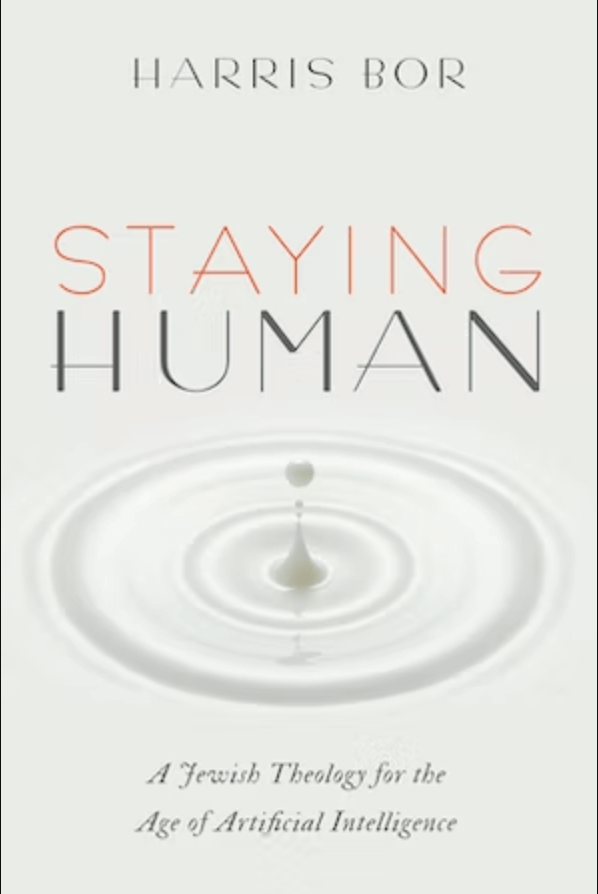 Harris Bor’s Staying Human: A Jewish Theology for the Age of Artificial Intelligence is a welcome addition to the burgeoning literature that reflects on our increasingly technologized world through a religious lens. Bor’s noteworthy contribution is to add a Jewish perspective to this conversation (which to date is largely Christian), and is thus aligned with the work of David Zvi Kalman and others, who likewise explore the contributions of Jewish thought and practice to our collective search for a humane future.
Harris Bor’s Staying Human: A Jewish Theology for the Age of Artificial Intelligence is a welcome addition to the burgeoning literature that reflects on our increasingly technologized world through a religious lens. Bor’s noteworthy contribution is to add a Jewish perspective to this conversation (which to date is largely Christian), and is thus aligned with the work of David Zvi Kalman and others, who likewise explore the contributions of Jewish thought and practice to our collective search for a humane future.
Bor weaves philosophical and theological strands together as he defends the notion of a creative human committed to wisdom, justice, and heartfelt connection to others. In what might surprise many Jews and scholars of Judaism, his philosophical approach draws primarily on Spinoza and Heidegger. Like Jonathan Sacks (quoted in the introduction), I am not comfortable with the integration of Heidegger – an antisemite, and a Nazi sympathizer and participant – within a Jewish theology. But Bor skillfully handles this challenge, openly acknowledging the distasteful aspects of Heidegger’s personal and political life while making good use of Heidegger’s philosophy to explore the role of humanity in the world. While Heidegger’s work bolsters Bor’s concept of immanent relationality, Spinoza provides the exploration into transcendent and all-encompassing realities. Bor uses the two as foils for one another, showing how the interplay of transcendent control with immanent (and hence temporary) relation can be seen in and through Jewish thought and applied to our present world. Bor draws on Spinoza’s sense of an all-encompassing divine and Heidegger’s need to live one’s life in full relation to one’s environment. In bringing these two together, Bor offers a counter to technology as will-to-power, presenting humanity as being always on the cusp of living fully in the world.
In both his philosophical and theological descriptions, Bor offers an extremely readable text with wonderfully clear explanations. There are times when – for this reader – a few too many disparate sources get pulled into a single conversation, as when Bor draws loosely on other religious and philosophical traditions to bolster a position explored from within his primary sources. Such moments distract from his deep engagement with his primary sources by a surface-level reference to outside communities. But overall, the book is an admirable work of exploration. For example, anyone who has read Heidegger knows what a challenge his philosophy can be; but even here Bor offers lucid and comprehensible account of difficult ideas and terminology. Bor invites readers to think along and engage weighty concerns without collapsing under the burden of jargon and convoluted sentences; the composition of the book thus offers a lively foray into philosophy and theology.
Much of the philosophical work in the book aims toward authentic living. After its initial work exploring Spinoza’s transcendent pantheism and Heidegger’s vision of being in the world, the book moves to more “typical” Jewish terrain. He rightly aligns this effort with the Jewish law, halachah, which he sees as a process of walking authentically in the world. Bor offers clear, incisive, and deep perspectives on being Jewish within time; specifically, he follows the calendar season and describes how our festivals offer Jews an experience of meaningful life. Naturally, he devotes an entire chapter to Shabbat, an appropriate recognition of the importance of Shabbat in the lives of Jews. The simultaneous release and return from worldly affairs, and the opportunity to reflect on what truly matters stands as a Jewish contribution to our reflections on technology and humanity.
Staying Human is at its most refreshing when Bor offers his own midrashic interpretations. He is a careful thinker who beautifully draws on his own orthodox Jewish upbringing and training to investigate our modern condition. He never takes an exclusivist tone, always gently describing the world of his lived experience and indicating moments where his understanding of how to walk the path of God corresponds to broader human needs. Accompanying this, his application of rabbinic traditions is thought-provoking and certainly establishes an entrance for others hoping to participate in conversations about religion and AI, especially within a Jewish framework. I do wish that Bor had spent an introductory chapter engaging the extensive literature on religion and AI (including the Singularity, which looms throughout the book), as this would strengthen the book for a reader not already familiar with the existing terrain and thus uncertain how to situate Bor’s own contributions. Even without this, however, the way that Bor engages Jewish scriptures (from Torah to Talmud to Kabbalah) and Jewish festival life is thoughtful and often even elegant. He delves deeply into Jewish perceptions of history, community, sovereignty, justice, and the divine to make a clear argument for retaining our human best in the face of would-be technological determinism.


